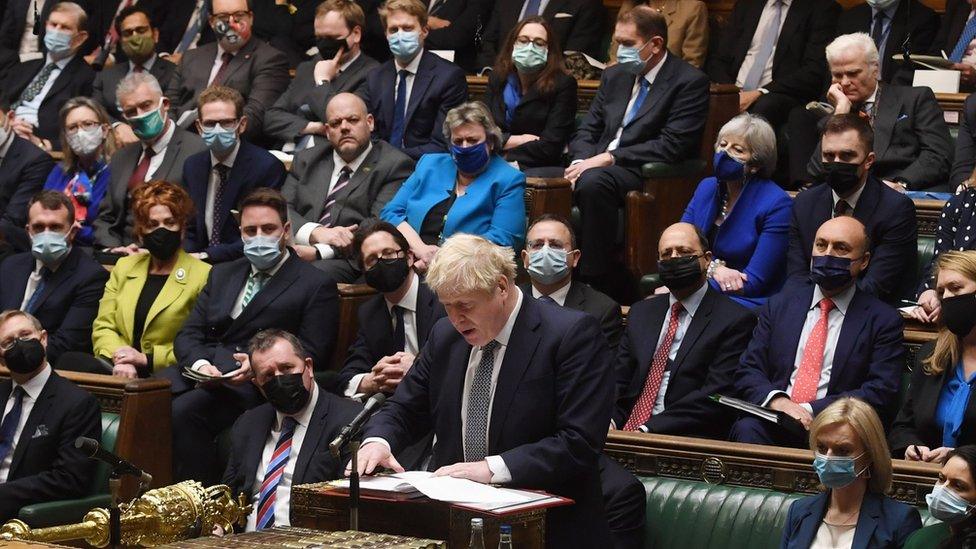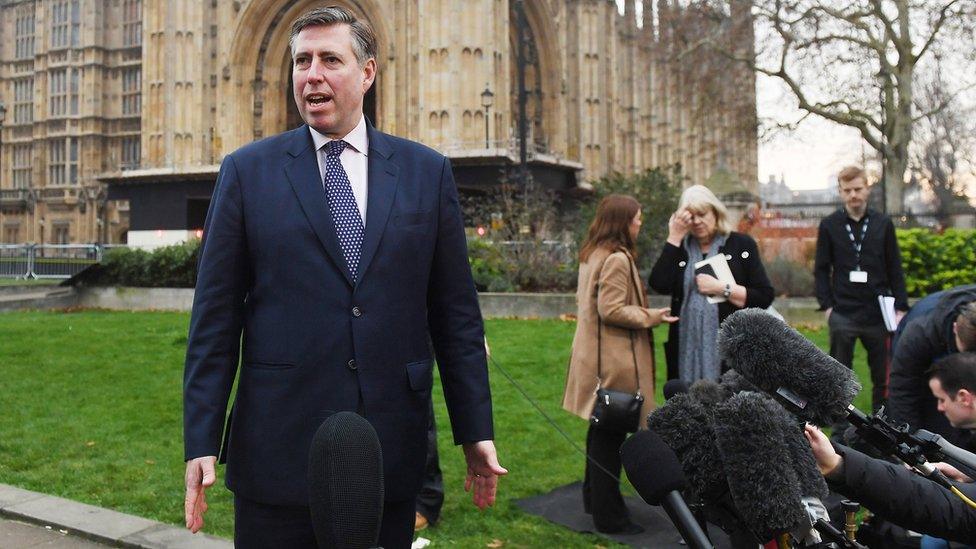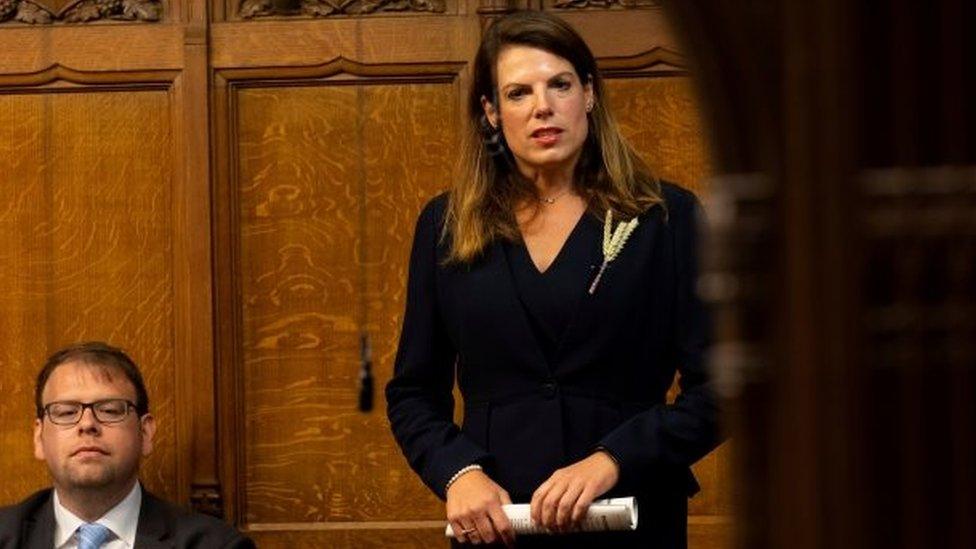Downing Street parties: Will two Tory tribes go to war with the PM?
- Published

"Party-gate" has left the MPs who sit behind Boris Johnson questioning whether to stand up for him
Culture Secretary Nadine Dorries has urged her colleagues to "keep calm heads" following the prime minister's admission he attended a drinks party in the Downing Street garden in May 2020.
She suggested some of the opposition to Boris Johnson was coming from his usual detractors.
But it is also the case that some of his previously vocal supporters - who admit they owed their election victory to Mr Johnson - are turning on him.
As one veteran of the May and Johnson premierships put it: "Some of the 2019 intake are feeling trigger happy."
This is, in part, driven by constituents who are making their views of so-called "party-gate" known in no uncertain terms.
One winner of a Red Wall seat told me: "I have an inbox like many colleagues - yes, the usual lefty detractors, but there is a considerable amount of criticism from Conservative voters.
"There is a real problem."
Another said that while it wasn't the worst "influx" of criticism they had experienced, the problem was growing, adding: "People are concerned, people are worried."
Their constituents' disgruntlement is feeding their own disillusion with their leadership.
As an MP who snatched their seat from Labour put it: "Lots of my colleagues are at the end of their tether.
"The polls are bad (one poll put Labour 10 points ahead this week) and are likely to get worse. This feels terminal."
Finger on the trigger
To trigger a leadership contest, 54 Conservative MPs would have to write to - or email - the chairman of the backbench 1922 committee, Sir Graham Brady.
He is a paragon of discretion and never reveals how many of his colleagues have been sending anti-leadership missives until the requisite threshold has been reached.
So when people estimate the number of letters which have gone in (and letters can be withdrawn, as well as submitted) these should be taken, not with a pinch, but with a mine of salt.
Nonetheless, the talk at Westminster is that perhaps half a dozen letters or emails have been sent by 2019 MPs who would have been assumed to have been supportive.
And even if accurate, it is the tip of an iceberg of discontent and restlessness.

Sir Graham Brady keeps tight lipped about how many letters he receives - until they hits the magic number
There are those who are critical privately but are keeping their powder dry until the senior civil servant Sue Gray delivers her report on the alleged parties and events during lockdown.
"I want to see the facts established," said one, while another added: "This is not something to do lightly."
So there is a moment of jeopardy for Boris Johnson.
A former government adviser characterised the situation like this: "His biggest problem is the number of newly elected MPs he has got.
"There is a real divide between those elected in 2010 and 2015 and those from 2019 - those who have lived through the omnishambles Budget can see that this doesn't need to be terminal."
That was when George Osborne's budget unravelled and Labour went ahead by around 10 points in the polls, but the Conservatives went on to win an overall majority in 2015.
He went on: "The new intake, who should be ambitious to get on the ministerial ladder, aren't used to seeing polls tighten, so instead they are worried that they could lose their seats."
Double whammy
But what of those sturdy veterans of the 2010 and the 2015 intake who have weathered previous political storms?
Well, the danger for the PM is that some of them are now openly breaking ranks too.
Caroline Nokes - a former minister elected in 2010 - said this week: "He is damaging the entire Conservative brand for his unwillingness to accept the strictures that other people have lived by."
William Wragg, a select committee chair who won his seat in 2015, told the BBC PM programme: "A series of unforced errors are deeply damaging to the perception of the party. The prime minister's position is untenable."
And off the record, some of the longer-standing MPs are privately critical.
"Anyone who has broken the rules must face the consequences," said one.
Another told me that he believed Mr Johnson was impugning the reputation of his own MPs.
But there is a disagreement over not just if to act, but when.

Caroline Nokes has publicly called for the PM to resign
Some MPs believe that any electoral consequences arising from the current turmoil need to be proven - and that would come after what are expected to be poor local election results in May.
But others are asking why good councillors should be potentially thrown to the wolves, and are more restless.
One longer standing MP has said that Chancellor Rishi Sunak "shouldn't look too eager" for the top job - it would be better to wait if a leadership challenge is to be successful.
Some of Mr Johnson's strongest critics in private insist that they are not part of any organised putsch or are in a rival camp - they are simply drawing their own conclusions from looking at their postbags.
One source insisted that Boris Johnson doesn't just have trouble with "Red Wallers" who worry that new voters might return to their old Labour roots, but "those in Lib Dem-facing seats" are worried too.
And after the North Shropshire and Chesham and Amersham by-elections, that is perhaps understandable.
A question of leadership
That said, a leadership challenge doesn't feel imminent.
It's possible the Sue Gray report may yet be more of a damp squib than the ammunition for a Conservative coup.
But several MPs I spoke to were fearful that hers would not be the last word on "party-gate", and that more damaging revelations may appear - either from Dominic Cummings or elsewhere if Mr Johnson stays in post.
A former government adviser who straddled the May/Johnson years put it like this: "When something happens, it could happen quite quickly.
"Under Theresa May, there was a growing sense of inevitability - it feels a bit like that now."